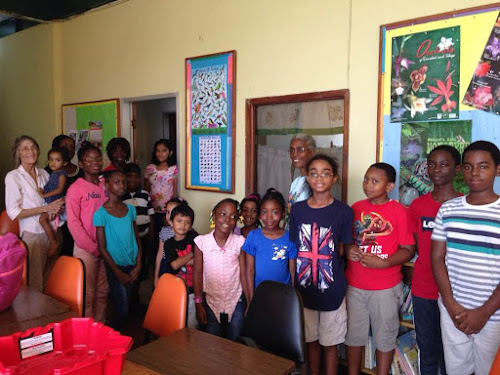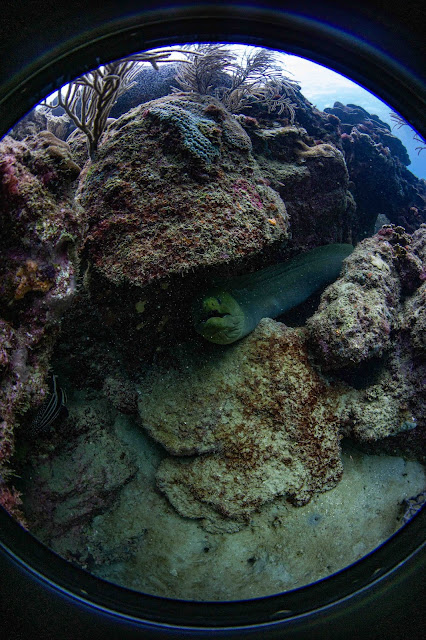School at Home
Mary Dena Hall, educator and principal of the Michael K Hall Community School in Carnbee Tobago for 25 years, offers some thoughts on home schooling the primary school age child in the era of Covid-19. Photos courtesy Mary Hall
The Community School Concept
We dreamed of a space that would be a primary school – for ages four and a half to 13 years – by day; and a community school for children and adults in the evening and the weekend. The community component would draw on parents, neighbors or friends; it could include aerobics, computer literacy, piano lessons, adult literacy; and could also use our computer-based programmes. Anybody would be welcome; we had few restrictions.
We named the school for Tony’s Dad, Michael K. Hall, who was respected for his lifetime of teaching.
Girls and boys learned everything together. The children were grouped based on their ages or skill levels. The school house stood on an acre of land. We had the horse; we planted food. They learned how to take care of the horse, to ride, they learned what horses eat and about saddles. When we had to move the school to our home in Carnbee, we had to adapt.
Love people more than product
Our philosophy is based on a broad understanding of democracy as equal regard for all life. We believe in loving people more than product; that the earth is where we meet and collaborate and learn to care for others. We believe in the arts as a vehicle for learning.
The school is intended to develop the whole personality. High on the list is receptivity to learning; to instill awareness of creativity and to develop originality, initiative and commitment; to make learning meaningful and enjoyable in an atmosphere where students have a sense of self-worth, compassion, responsibility and willingness to share. The arts component is integral to the curriculum so that students would learn skills and appreciation of verbal and non-verbal expression.
At MK Hall School, the teacher is the guide
The school was designed around 30 to 35 children. We always had two qualified teachers and some support persons. Marilyn Khabir had her masters in Early Childhood education from NYU; she taught the infant levels. (Mary was an educator by training, with a focus on education for special children.)
The teacher has to interpret the syllabus. He or she must know the whole syllabus, understand the skills that the children must acquire, and build the activities to improve the proficiency of the child. All activities incorporate reading, math and writing.
Almost everything could be taught without textbooks
If
you told teachers there’s no textbook, what would they do?
A teacher should understand the syllabus in terms of the skills required by the
student. Anything in your home can become a teaching opportunity. You bake bread: the younger ones
appreciate the textures of flour, yeast, water. The older ones can find out
where flour comes from, how it’s made, what is yeast and how it works. They all
learn how to measure.
Here’s an example: When you come home from the grocery, look at the produce with your child. Find out which country each item came from; look them up in an atlas. Talk about the cost of some items. Look at the list of ingredients on packages. Your child could name the good groups: fruit/vegetables; carbohydrates; or name colours; count cans and arrange from big to smallest; look at weights on cans, or volumes.
This is a technique called theme teaching which encourages the child to learn for herself. We found the most useful themes were our holidays and festivals. The newspapers would be full of pictures and content. And there would be activities taking place in the community. Materials were readily available. They learned about food, history, geography, music.
At Carnival, we became a Mas Camp
We developed a band, made costumes and played mas on the street. For Divali, parents would came in to make the sweets. You can use whoever is in the group: parents bring their knowledge and can demonstrate and answer questions. Parents can teach a child anything in the course of regular living: mother in the kitchen or doing housework; father fixing the car.
Knowledge comes from within
I think we are steeped in the attitude that knowledge comes from above. I used to wonder what it might have been like to land on an island as a slave, with plantation owners demanding things in a different language. You quickly internalise the idea that if you don’t line up the way these people want, you will be beaten or killed. Most slaves were young, 14-18, and they had to learn quickly what massa wanted. Can you imagine the terror of not knowing, and the challenge and fear to learn what was expected of you. I believe that terror still exists in our education system: what the Ministry wants; what Oxford wants; what your parents want; what you must do to succeed. There is a deep-seated fear of not being adequate.
Let me tell you about my son Mauri who went to secondary school (after our
school) where licks were still administered. He wanted to know what licks felt
like; so he did something naughty and was lined up with the naughty kids to
each receive 10 lashes. When it came to his turn, it hurt so bad, that after
five, he asked if he could get the next five later. The teacher allowed him to
go to the back of the line to receive his second five after the other kids. It
seems that became a “thing:” kids would ask to defer their second five. (Mauri
is now working towards his PhD in Economics.)
MK Hall Community School closed at the end of the school year in 2019
Children can achieve without “licks”
In the 25+ years of MK Hall, all students did well at SEA. Many may have started slower but they all got to the required level. We taught reading with phonics. Within two years, they are all reading; once a child can read, there’s no stopping them. The curriculum included language, mathematics, science, art and craft, music and drams, games and physical education, IT, sex education, social studies, Spanish, cookery and exploration of the multi-cultural society through religion, festivals, customs and traditions. We didn’t have classes with these names but we explored and exposed the children to these concepts.
Computers are useful
We invested in a bank of computers and a specific designed programme. Each child was given an ID and could log in and spend part of an hour completing a module and receiving a score. The next time they logged in they would be taken to the next module. The teacher could access the scores of all the children and interpret their levels of learning. But this was an add-on. Computer learning at primary school level must be supervised.
100 ways to get an education
We should not be afraid of alternative methods; of learning at home. Parents must not discount the basic good instincts of their children. There is nothing wrong with your child.
Children need to do real things with other children. Their learning must be guided by an adult. Remember they are ready to learn anything by any means. Speak encouragingly to your child. Read to him or her. And if you lose patience, call on your neighbours and friends: create “bubble play groups” for the children of two or three families. Pick a different parent-supervisor for each day, and let the older children take care of the younger ones.
This Covid19 year
Your primary level child does not have to lose by being out of school in this year. There is much you can do as a parent or caregiver to enhance and broaden and personalize your child’s learning, once you recognize that all subjects come from real life situations. There is no real life experience that does not hold the elements of all the subject areas. The educational possibilities are only limited by the imagination. The sky is the limit. You will be teaching the curriculum, learning new things yourself, and it is fun!
Portrait of Mary Hall by one of her students










